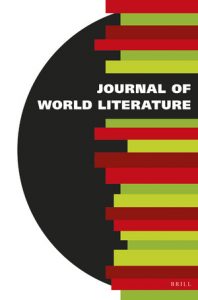Professor Francesca Orsini and Laetitia Zecchini compiled Part II of the Special Issue: The Locations of (World) Literature: Perspectives from Africa and South Asia – Worlding Genres and Refractions.
Orsini, Francesca and Letitia Zecchini (eds.) Special Issue: The Locations of (World) Literature: Perspectives from Africa and South Asia – Part II: Worlding Genres and Refractions, Journal of World Literature (Volume 4, Issue 2).
This Special Issue of the Journal of World Literature was edited by MULOSIGE’s Principal Investigator Professor Francesca Orsini and CNRS researcher Laetitia Zecchini. MULOSIGE researchers Dr Fatima Burney and Dr Karima Laachir also contributed essays to this issue. These are available on Open Access and can be found here.
You can read an extract from the Introduction of this Issue, written by Orsini and Zecchini, below:
to a poem, the location, whether cultural, historical, geographical or fictive – is everything.
Mehrotra 168
That location matters for critics, readers but also texts, as Arvind Krishna Mehrotra’s quote suggests, is a deceptively simple point. To some readers, location as context and standpoint reveals and deepens a text’s possibilities, to other readers it constricts and confines them. Indeed, the apparent paradox of locatedness and open-endedness is at the heart of many writerly and critical reflections on location and literature, as is the idea that literature both inhabits and creates worlds. There is no escape from the location of perspective or point of view, be it one or many. This is all the more crucial in world literature, which attempts to view and connect literary phenomena on a very large scale. “For any given observer,” David Damrosch argued in What is World Literature?, “even a genuinely global perspective remains a perspective from somewhere, and global patterns of the circulation of world literature take shape in their local manifestations”. Building on Damrosch’s point, location for us is not simply a geographical, historical, or cultural context but a standpoint, a position, an
orientation, a necessarily partial and particular perspective, however complex, ample and multiversal it may be, from which a writer represents and imagines his or her worlds.
The essays in the second part of this special issue take up location from several perspectives. Claire Ducournau and Tristan Leperlier show that location can weigh as a burden and a fixed set of expectations, but also as a field of tension, particularly for African and Asian writers. Their essays demonstrate how African and Maghrebi writers challenge the ethnicizing expectations thrust upon them by a global publishing market. Burney, Laachir and Siddique take up worlding from the perspective of genre (see also Garnier, Orsini and Zecchini in 4:1). Genres, languages and conceptual vocabularies carry different meanings and resonances of “world.” For example, Fatima Burney notes that:
“In Urdu poetry and particularly ghazal poetry, dunyā, which is the word most commonly used to mean ‘world,’ often carries a
connotation of lack; it is something which is simply worldly rather than eternal, like the divine … Accordingly, to be fully concerned with the world is to have lost sight of the ultimate and eternal truth(s) which go beyond the physical realm of perception.”
You can explore this issue of the Journal of World Literature here.



Leave A Comment